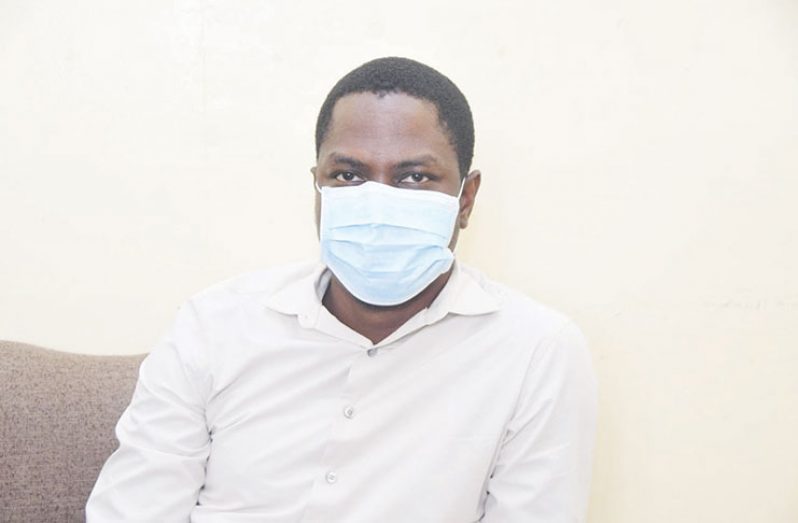-Region Four RHO says rainy seasons pose a threat to COVID-19 fight
NO rain will wash away the Novel Coronavirus (COVID-19) disease, but it is likely to make the fight against the scourge more complicated, said Regional Health Officer (RHO) of Region Four (Demerara-Mahaica), Dr. Quincy Jones.
Existing evidence has shown that Guyana experiences two seasons: rainy and dry. And, on the coast, the rainy season occurs from May to mid-July and mid-November to mid-January. This year, unlike many others, the level of caution must be higher, not just because of potential inundation caused by torrential showers, but because the rainy season is synonymous with the flu season.
Though the flu season is common, there are similarities and differences between Covid-19 and the flu. Some of the similar symptoms related to the two conditions are a dry cough and fever. Other similar symptoms include aches, fatigue, headache and chills.
Scientific evidence, however, proves that COVID-19 is different in the sense that it causes shortness of breath and difficulty breathing. With the similarities outweighing the differences, confusing the two conditions will be very easy, said Dr. Jones, in a recent interview with Guyana Chronicle and Prime News.
“The rainy season poses a threat to the fight against COVID-19 because it is associated to flu season…there is where flu-like symptoms will come up and there will be confusion,” said the RHO, adding that this will require additional precautions from the average Guyanese and health authorities. The battle against COVID-19 has already been difficult because persons have been flouting the containment measures, which are geared at promoting social distancing in order to contain the spread of the disease. Over 100 Guyanese have so far been infected by the disease and ten persons have lost their lives here.
Consolidated statistics have also proven that there has been a consistent increase in the number of confirmed cases. While it has been easy to detect these cases, the flu season could disrupt this flow, as it is likely that persons will start to “pop-up” with symptoms, similar to both COVID-19 and the flu.
“We will ask patients to be attentive to what the authorities are saying and cooperate with health workers to get through this…persons will need to do things to avoid getting the flu and this will include routine things that have been touted over the years,” said Dr. Jones, adding: “Cognisant that flu-like symptoms could be mistaken for COVID-19, persons will have to utilise the COVID-19 app, visit the mobile units or call the hotline.”
It is also important that persons do not self-diagnose themselves because it could prove detrimental if the condition is actually COVID-19.
While, according to the World Health Organization (WHO), the flu kills about 1 in 1,000 persons; the COVID-19 pandemic is still unfolding, so a precise death rate has not yet been determined. To date, however, over 265,000 persons, globally, have lost their lives to the dreaded disease.
It is to this end that Dr. Jones said Guyanese must adhere to the preventative measures in place and even look out for advisories, which will be released as the rainy season unfolds.
WETTER THAN USUAL
The local “Met office” has already predicted that there are increasing chances for “wetter than usual” conditions across all regions. The met office also said there are growing concerns of flash flooding, as above normal rainfall is expected across all regions.
“With the rain coming, the same health practices stand…outside of COVID-19, the health system is still as it and all the necessary routine measures, which we asked persons to adhere to in 2019, is still valid to date,” said Dr. Jones.
In 2019, during the rainy season, the public health ministry had released a long list of advice to persons. Part of the advice reminded persons to stay out of the flood water as much as possible, as it can greatly reduce your chances of contracting diseases such as skin irritation, skin infection, Leptospirosis, diarrohea and other water-borne diseases.
“During flooding, you may notice an increase in mosquitoes. Protect yourself and family against mosquito bites by sleeping under mosquito nets, use mosquito repellents and coils. Ensure that all water stored around your homes in containers is covered to reduce the breeding of mosquitoes. Remember, the mosquito that spreads Zika, Dengue and Chikungunya virus breeds in fresh, still water (especially fresh rain water) around your home,” said the ministry.
Persons were also advised to use safe water for drinking, cooking, brushing teeth, making ice and beverages, and keeping food supplies away from contact with any flood water. Wash all fruits and vegetables with treated safe water and peel before eating. Remember to keep all food items and drinking water in covered containers
Cook food thoroughly and consume cooked meals within two hours of preparation. Store all remaining food safely in a refrigerator and reheat thoroughly before consuming.
Wash hands with soap and safe water or use hand sanitizers, especially before eating meals, after going to the toilet or latrine, cleaning children or handling animals and contaminated materials. These measures also help with the prevention of COVID-19.



.jpg)









